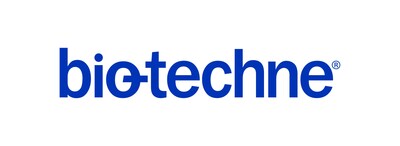LUNAPHORE COMET™ PLATFORM PAVES THE WAY FOR SPATIAL BIOLOGY ADOPTION IN CLINICAL RESEARCH
Rhea-AI Summary
Bio-Techne announced significant clinical data from its Lunaphore COMET spatial biology platform. The platform integrates with clinical research workflows and uses IHC-validated antibodies for rapid panel development. Research conducted with the National Tumor Institute and Nucleai revealed tumor microenvironment features that could predict therapy response in melanoma patients. The study combined multiplex immunofluorescence with AI-powered biomarker analysis, marking the first application of this technology in a clinical trial. Additional research with Johns Hopkins University demonstrated the platform's novel amplification technique for comprehensive tumor profiling.
Positive
- Platform successfully integrated into clinical research workflows
- First-time application of the technology in a clinical trial setting
- Successful collaboration with major research institutions
- Platform demonstrated ability to predict therapy response
Negative
- None.
News Market Reaction
On the day this news was published, TECH gained 2.27%, reflecting a moderate positive market reaction.
Data tracked by StockTitan Argus on the day of publication.
COMET, a best-in-class spatial biology platform, seamlessly integrates into standard clinical research workflows. Using off-the-shelf, clinically IHC-validated antibodies, new panels can be quickly developed and validated. Additionally, COMET enables high-plex workflow automation, adding unique value to clinical studies by facilitating robust and timely decision-making in treatment strategies.
Research conducted in collaboration with Prof. Paolo Ascierto, National Tumor Institute Fondazione G. Pascale, and leading AI-powered spatial biomarker and diagnostics company, Nucleai, uncovered potential tumor microenvironment (TME) features predictive of response to therapy. In the cohort study of immunotherapy-treated metastatic melanoma patients, a comprehensive spatial immuno-oncology multiplex immunofluorescence (mIF) panel was combined for the first time with advanced AI-powered biomarker analysis. The findings highlight that the fully- automated workflow and AI tissue analytics can be applied more broadly in immunotherapy drug development to enhance the understanding of treatment efficacy, ultimately improving patient outcomes.
"COMET enables the identification of multiple biomarkers and spatial interactions between different cell types within the TME," said Dr. Ascierto. "Its use together with Nucleai's AI spatial biomarker platform in predicting therapy response for patients enrolled in the SECOMBIT1 study, marks the first application of this innovative technology in a clinical trial, representing a significant step toward identifying predictive biomarkers."
"This study demonstrates our shared vision to accelerate predictive spatial biomarker development and showcases the COMET platform's unique potential in enabling the design of more effective immunotherapy strategies in advanced cancers such as metastatic melanoma, said Dr. Matt McManus, President of Bio-Techne's Diagnostics & Spatial Biology Segment. "We're committed to pushing the boundaries of healthcare by advancing spatial biology in clinical research and ultimately improve patient outcomes."
Another study conducted in collaboration with Prof. Janis Taube, Johns Hopkins University School of Medicine, demonstrates the potential of the novel amplification technique on the COMET platform, allowing scientists to comprehensively profile the TME, leading the way for improved insights in clinical research.
At this year's Society for Immunotherapy of Cancer's (SITC) Annual Meeting novel data sets will be presented, showcasing the scientific advancements brought by COMET.
To learn more about Lunaphore's poster presentations and activities at SITC, please visit: https://lunaphore.com/our-events
About Bio-Techne
Bio-Techne Corporation (NASDAQ: TECH) is a global life sciences company providing innovative tools and bioactive reagents for the research and clinical diagnostic communities. Bio-Techne products assist scientific investigations into biological processes and the nature and progress of specific diseases. They aid in drug discovery efforts and provide the means for accurate clinical tests and diagnoses. With hundreds of thousands of products in its portfolio, Bio-Techne generated approximately
About Lunaphore
Lunaphore Technologies S.A. – a Bio-Techne brand, is a Swiss company born in 2014 with the vision of enabling spatial biology in every laboratory. Lunaphore provides solutions based on a game-changing chip technology that can extract spatial proteomic and transcriptomic data from tumors and other tissues, transforming any assay into multiplex spatial biology through a streamlined and easily integrated process. Lunaphore empowers researchers in immunology, immuno-oncology, and neuroscience to push the boundaries of scientific discovery and drug development. Lunaphore's technology enables the identification of biomarker "signatures" with clinical relevance to support the development of diagnostic tools and streamline clinical trials, to ultimately improve patient outcomes. For further information on Lunaphore and its products, please visit https://lunaphore.com.
About COMET™
COMET™ is the only fully automated, high-throughput, hyperplex platform ensuring scalability and reproducibility without the need to conjugate primary antibodies. COMET™ provides walk-away automation, integrating staining, imaging, and image preprocessing steps to obtain standard hyperplex images. The multiomics capability of COMET™ enables the simultaneous analysis of both RNA and protein data within the spatial context of tissues to enhance the understanding of cellular dynamics and disease processes. COMET™ generates highly robust and reproducible data with full tissue preservation, allowing researchers to perform downstream modalities such as H&E or transcriptomics using the same slide. Its superior tissue profiling capabilities facilitate the analysis of 40 different spatial markers in each automated run on a tissue slide. In contrast to other spatial biology solutions, COMET™ works with off-the-shelf, label-free primary antibodies, making panel design much more flexible and faster than any other hyperplex solution. COMET™ works with regular glass slides from standard histology workflows; it is validated for human and mouse samples and is compatible with any other animal sample. The platform can be used for a wide range of research applications, allowing for a dramatic improvement in the understanding of disease pathology. To learn more about the COMET™ platform, please visit: https://lunaphore.com/products/comet/
Bio-Techne Corporation (NASDAQ: TECH)
David Clair, Vice President, Investor Relations & Corporate Development
david.clair@bio-techne.com
612-656-4416
For further information on Lunaphore:
Irene Tamayo, Senior Director, Product Strategy and Marketing
communications@lunaphore.com
1
An international study focusing on the different sequences of treatment in BRAF-mutated advanced melanoma patients.
![]() View original content to download multimedia:https://www.prnewswire.com/news-releases/lunaphore-comet-platform-paves-the-way-for-spatial-biology-adoption-in-clinical-research-302295964.html
View original content to download multimedia:https://www.prnewswire.com/news-releases/lunaphore-comet-platform-paves-the-way-for-spatial-biology-adoption-in-clinical-research-302295964.html
SOURCE Bio-Techne Corporation








